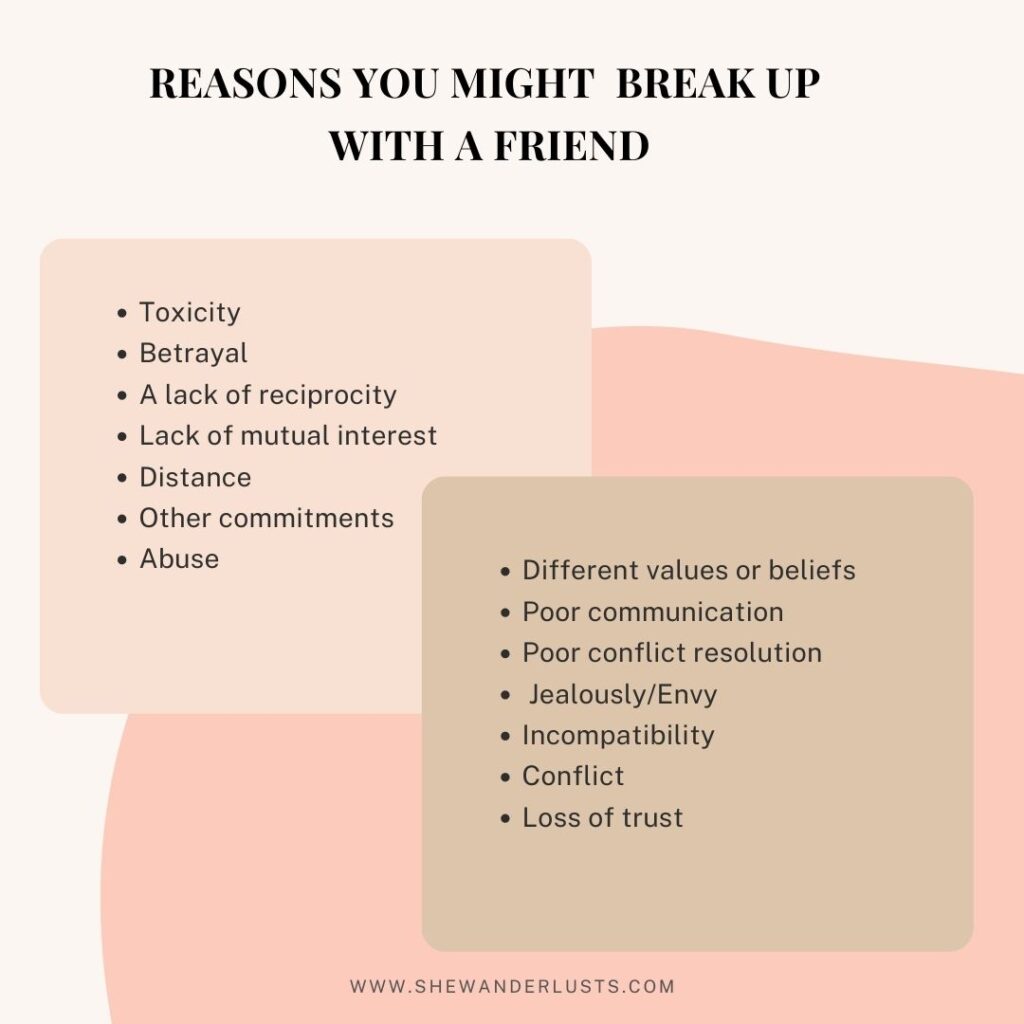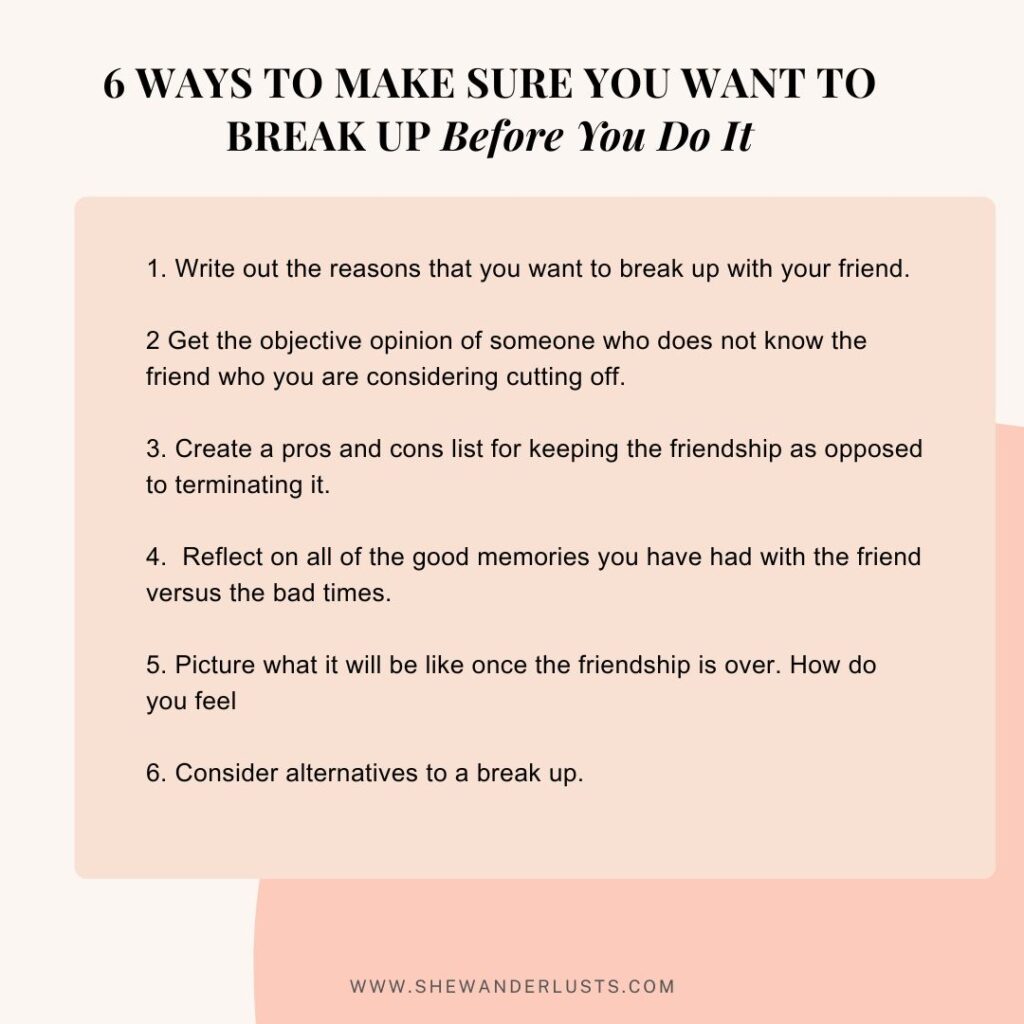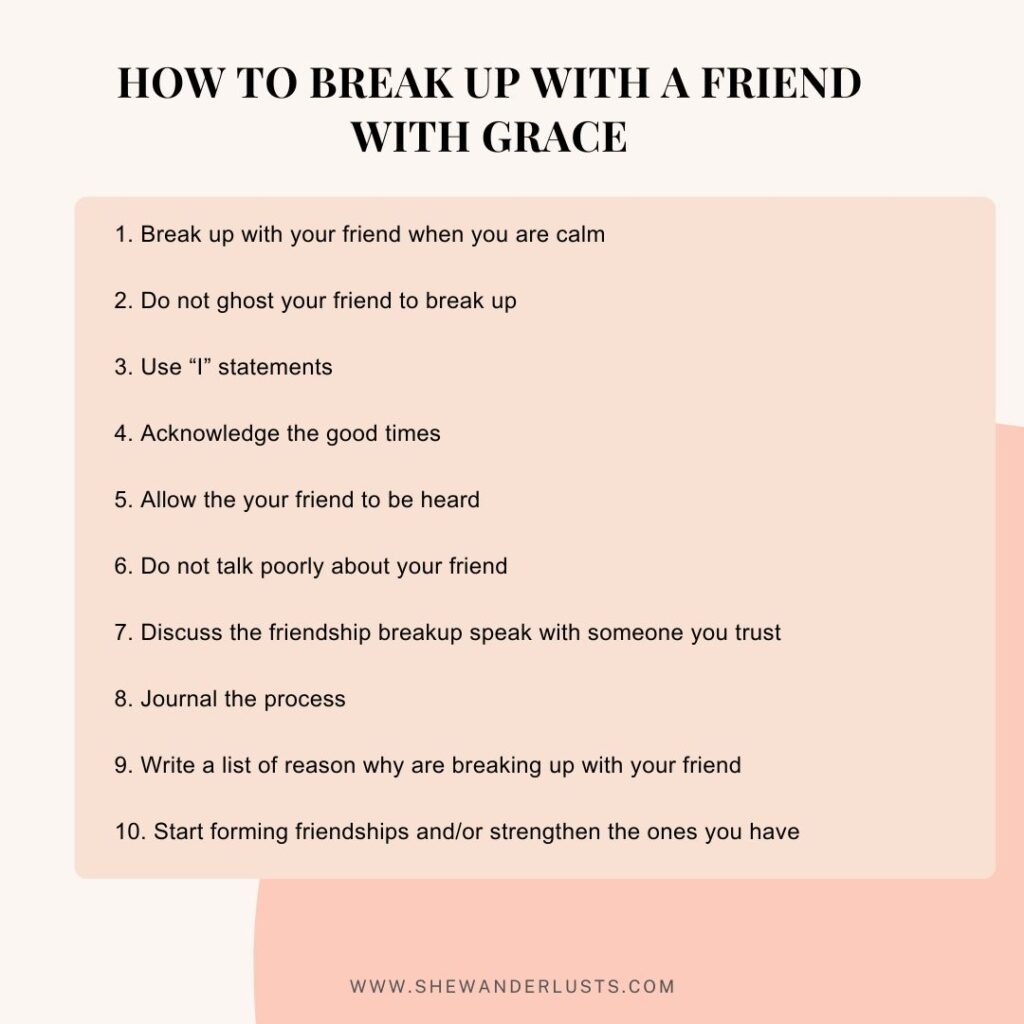
Tips for Breaking Up with a Friend With Grace
Not all relationships last forever. Yet, we often forget this principle when it comes to friendships. But, honestly, breaking up with a friend can be as challenging as ending a romantic relationship.
When you end a friendship, you are leaving behind someone you once relied on during good and hard times. Someone with whom you shared (or still) share mutual interests. Someone that you connected with on a deep level. And perhaps, someone you viewed as family.
Reasons someone may end a friendship
Friendships end all the time, for various reasons:

And the list goes on. No matter the reason, breaking up with a friend is not easy. Before making this major decision, make certain it is really what you want. And then do it with grace.
How to Make Sure You Want to Break Up with Your Friend
We are not 100 percent certain on most of the decisions we make in life. But when deciding to cut ties with a friend — or anyone for that matter — you should be as certain as possible. This will allow you to avoid long-term regret, and guilt, or worse, changing your mind. Having someone change their mind after a break up — whether romantically or platonically — can be extremely traumatic.
Even if you are able to continue the relationship, it will never be the same because the level of trust that was once there will no longer exist. So make sure you are sure that you want to break up with your friend BEFORE you do it.
To avoid potentially reneging on your decision to breakup, you can do a couple of things:
1. Write out the reasons that you want to break up with your friend.
Evaluate whether the reasons you want to break up are temporary or permanent. With time, we can overcome a lot of obstacles in friendships, even if it does not seem like it at the time. So take a beat and ask yourself, do the issues we are currently facing justifying ending the friendship entirely. Can the issues be resolved with time and/or effort from both parties?
2. Get an objective opinion of someone who does not know your friend.
Sometimes getting an unbiased opinion of someone outside of the friendship will allow you to determine whether you should in fact end your friendship, or whether there are better alternatives. That same person can also potentially help you navigate whatever hurdles you are facing in the friendship.
3. Create a pros and cons list.
What do you stand to gain or loose if you break up with your friend? Will your life improve for the better or worse? Or, will the transition be neutral?
4. Reflect on all of the good memories versus the bad.
Which memories stand out the most? Do the bad times really outweigh the good times, or are you and your friend just in a funk? Remember, no relationship is always sunshine and rainbows. There will be highs and lows. A good friendship is comprised of people who are capable of being vulnerable, communicating, and committing to weathering life’s hurdles.
5. Picture what it will be like once the friendship is over.
Play out what your life will be like once you cut ties with your friend. Of course, we cannot predict the future, but you should have a general idea of what joys or adventures your friend brings to your life. How do you feel when you play out your friend no longer being in your life?
6. Consider alternatives to a break up.
Many times when we are upset or overwhelmed, we go into flight mode. And as helpful as that mode can sometimes be, it can be equally as harmful. If you have decided to end a friendship, take a moment to consider if there are other alternatives. Can you take a break from your friend? Will open communication with your friend resolve the issue(s) that are prompting you to end the friendship? Will more or less time together help? These are just some questions to ask yourself when looking for alternatives to a breakup.
PIN IT in case you need it later

Once you have made certain you really want to break up with your friend, do it with grace.
How to Break up With Your Friend With Grace
1. Break up with your friend when you are calm.
If you are in a heated or very emotional state when you decide to end your friendship, wait and give yourself time to calm down. This will ensure that you are in a rational state of mind when you ultimately end the friendship. It will also reduce the chances of you being unnecessarily rude, aggressive, or unkind during the breakup.
2. Do not ghost your friend to break up.
End your friendship in-person or via phone, letter, email, or text. This may seem like common sense. But many people end friendships by simply “ghosting” the other individual. Ghosting a friend is extremely hurtful to the other party involved. And it often reflects a lack of maturity and poor communication on the party doing the break up.
That said, there are some exceptions where ghosting may be appropriate. If someone is dealing with a violent or very toxic individual, an abrupt cessation of communication is probably wise. Under most circumstances, however, an in-person meeting, phone call, email or text is much better than ghosting someone. The conversation or message does not have to be drawn out. A brief conversation or message will suffice.
3. Use “I” statements.
During the breakup, use “I” statements to get your message across. For instance:
“I think it best that we stop communicating because I do not believe we still share the same values.”
“I no longer have a lot lost trust in our friendship, and no longer want to continue this relationship”
“I feel betrayed, and I know that I no longer have the same level of commitment to our friendship”
Using “I” statements can reduce the defensiveness, accusations, and blaming that are typically attached to difficult conversations. It will also increase the likelihood that the other party will actively listen to what you are saying.
4. Acknowledge the good times.
When it’s time to end things with someone, the mind has a funny way of remembering all of the bad times. If you have the emotional bandwidth, I recommend acknowledging the good times. This will not only help with the other person’s healing journey, but yours as well.
5. Allow your friend to be heard.
Unless the friend you are breaking up with is being aggressive or abusive, allow them to briefly respond to the breakup. This of course is not required, but you may learn something that will help you form better friendships in the future.
6. Do not talk poorly about your friend.
Even if you are m tempted, do not talk poorly about your friend before or after the breakup. You’ll want to avoid doing this for at least two reasons. First, you do not want your friend to catch wind of your ill-feelings or your desire to break up before they hear it from you. Second, engaging in negative talk about the individual you are no longer intend to be friends with will only delay your ability to move on and make peace with your decision.
7. Discuss the friendship breakup speak with someone you trust.
Before, during, and after the breakup, consider speaking with a counselor, family member, or non-mutual friend. The primary goal of the conversations should not be to reflect on the negative details of the friendship. Rather, the conversation should center around any residual feelings you have concerning the breakup, why it happened, and how you would like to move forward.
8. Journal the process.
Although you’ll be initiating the breakup, you are bound to have some residual negative emotions, including guilt, grief, and possibly regret. After losing your friend, journaling will give you a safe space to process your emotions and heal.
I recommend using the Best Journal Ever. It’s by far my favorite journal because it’s minimalistic, yet motivational. The journal includes prompts, space for journaling, inspirational quotes, and even a habit tracker.

If you have no use for a habit tracker, The Five Minute Journal will be better suited to your needs. It also has weekly challenges, inspirational quotes, daily affirmations, and space to journal. If I didn’t prefer a habit tracker, The Five Minute Journal would be my go-to.

9. Write a list of reasons why are breaking up with your friend.
Even if you do not journal the breakup process, at the very least prepare a list of reasons why you have decided to break up with your friend. Having this list of reasons will allow you to stand by your decision when you start to feel regretful, guilty, or even tempted to renege on your decision.
10. Start forming friendships and/or strengthen the ones you have.
If you have many other friendships, this may not be applicable to you. But if you are breaking up with the closest, or only, friend you have, it is imperative that you try to start forming or strengthening friendships as soon as possible. The reason is that we are social creatures. If you do not have other social outlets you may become overtaken by your emotions after the friendship ends.
PIN IT in case you need it later

These are just a few tips that you can use when breaking up with a friend. There are many tactics and strategies. The main objective is to do it with sure you are certain of your decision, and to do it with grace so that you can minimize the residual negative emotions and heal a quickly as possible.
Are you planning on breaking up with a friend, or have done it in the past? If so, please share some of your tips or thoughts in the comments section.
PIN this article to read it later




2 Comments
R.
I just stumbled upon this article and it made me so seen and validated my overwhelming emotions. Thank you!
KD
You are very welcome! I’m so glad that my article helped validate what you are feeling.